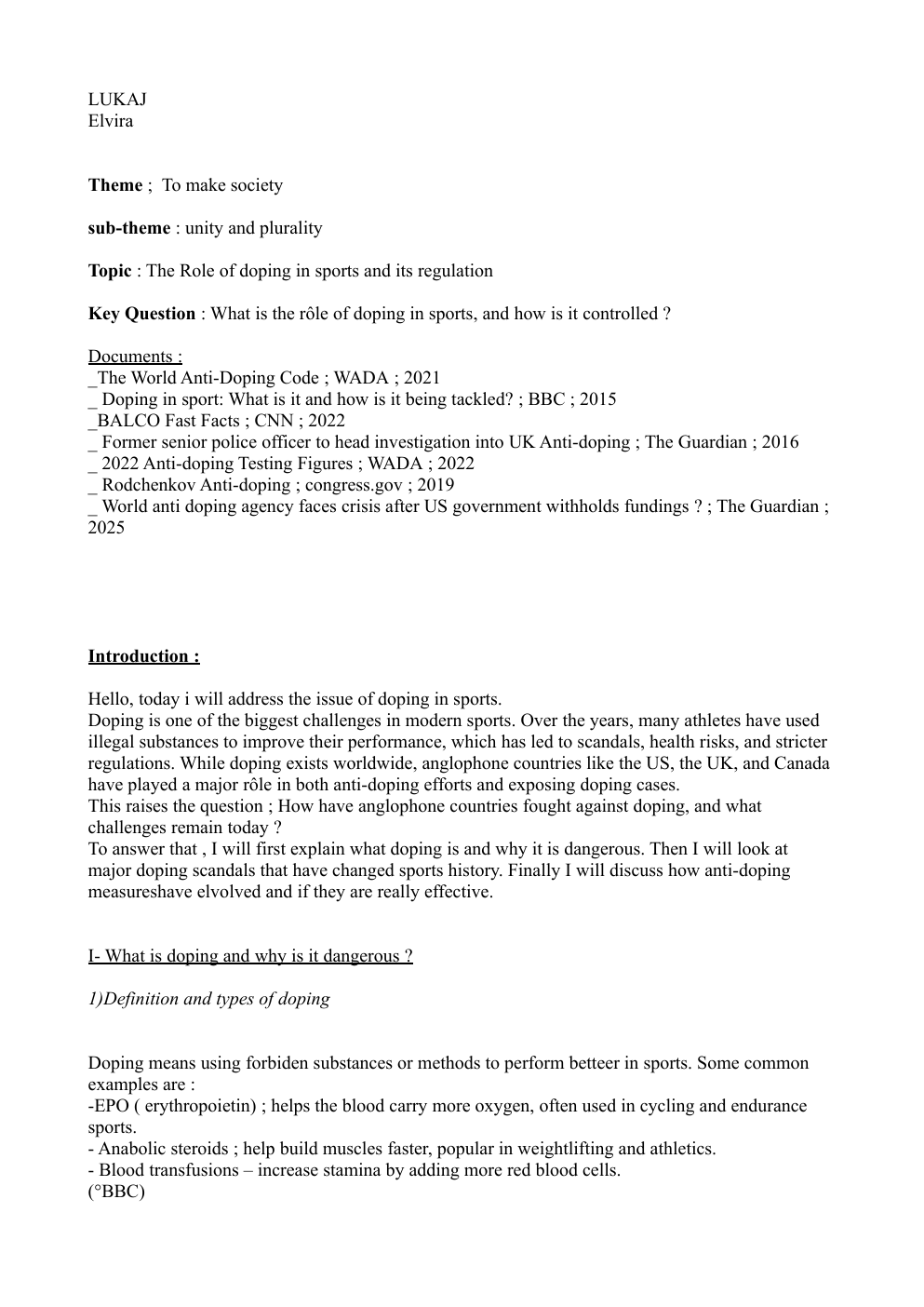What is the rôle of doping in sports, and how is it controlled ?
Publié le 04/04/2025
Extrait du document
«
Theme ; To make society
sub-theme : unity and plurality
Topic : The Role of doping in sports and its regulation
Key Question : What is the rôle of doping in sports, and how is it controlled ?
Documents :
_The World Anti-Doping Code ; WADA ; 2021
_ Doping in sport: What is it and how is it being tackled? ; BBC ; 2015
_BALCO Fast Facts ; CNN ; 2022
_ Former senior police officer to head investigation into UK Anti-doping ; The Guardian ; 2016
_ 2022 Anti-doping Testing Figures ; WADA ; 2022
_ Rodchenkov Anti-doping ; congress.gov ; 2019
_ World anti doping agency faces crisis after US government withholds fundings ? ; The Guardian ;
2025
Introduction :
Hello, today i will address the issue of doping in sports.
Doping is one of the biggest challenges in modern sports.
Over the years, many athletes have used
illegal substances to improve their performance, which has led to scandals, health risks, and stricter
regulations.
While doping exists worldwide, anglophone countries like the US, the UK, and Canada
have played a major rôle in both anti-doping efforts and exposing doping cases.
This raises the question ; How have anglophone countries fought against doping, and what
challenges remain today ?
To answer that , I will first explain what doping is and why it is dangerous.
Then I will look at
major doping scandals that have changed sports history.
Finally I will discuss how anti-doping
measureshave elvolved and if they are really effective.
I- What is doping and why is it dangerous ?
1)Definition and types of doping
Doping means using forbiden substances or methods to perform betteer in sports.
Some common
examples are :
-EPO ( erythropoietin) ; helps the blood carry more oxygen, often used in cycling and endurance
sports.
- Anabolic steroids ; help build muscles faster, popular in weightlifting and athletics.
- Blood transfusions – increase stamina by adding more red blood cells.
(°BBC)
These methods confer unfair advantages, which is why they are prohibited by the World AntiDoping Agency (WADA).
2) Health risks and ethical issues
Doping is not just cheating , it’s also dangerous.
Athletes who use EPO have a higher risk of heart
attacks.
Steroids can cause serious liver problems and even affect mental health.
According to the World Anti doping code : « Doping is fundamentally contrary to the spirit of sport
and enfangers athletes health »
(°The World Anti-Doping Code)
But doping is not only a health problem.
It’s also damages the reputation of sports.
Fans want to see
fair competitions, not races where the winner is just the best cheater.
This is why countries like the US, the UK, and Canada have strict anti-doping rules.
However, history shows that rules are not always enough, and new doping scandals keep appearing.
II- Doping Scandals that changed Sports
1)
In the 2000s, the US had a big doping scandal called BALCO scandal.
BALCO ( Bay Area
Laboratory Co-operative) was a company that gave illegal drugs to famous athletes.
These drugs
helped them run faster, get stronger, and recover quicker, but they were banned in sports.
What happened ?
- BALCO created a secret drug called « the Clear », a steroid that couldn’t be found in normal
doping tests.
- Many famous American athletes used these drugs, including Marion Jones ( a sprinter) and Barry
Bonds ( a baseball player)
- The US government investigated BALCO, and several people, including athletes had legal
problems.
Consequences :
- Marion Jones admitted to using steroids .
She lost her Olympic medals and went to prison for six
months.
- Barry Bonds was accused of lying about using steroids.
His reputation was damaged, even though
he was one of baseball’s biggest stars.
- The US changed it’s anti-doping rules, making drug tests stricter to....
»
↓↓↓ APERÇU DU DOCUMENT ↓↓↓
Liens utiles
- The impact of social media on our societies through the changes in lifestyles, diversity and human rights.
- Encyclopedia of Philosophy: The Doubt and the Cogito - DESCARTES
- The Buddha of suburbia
- the stolen generation
- Is there one side of the coin in the myth of the frontier?

































